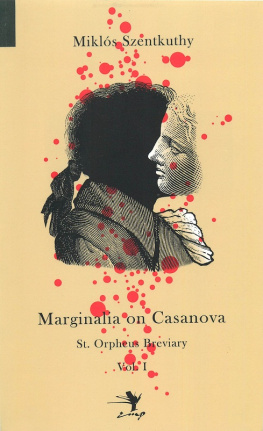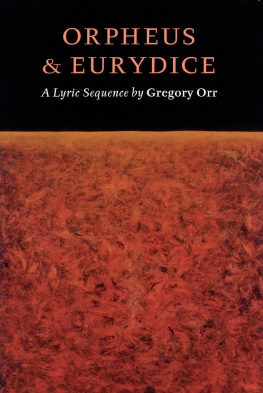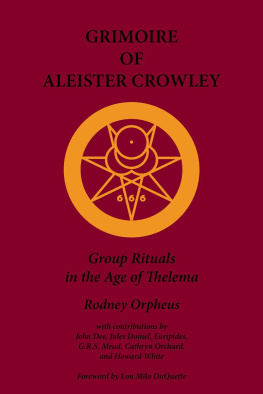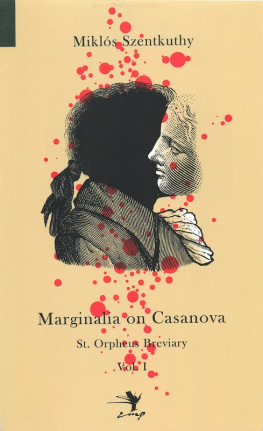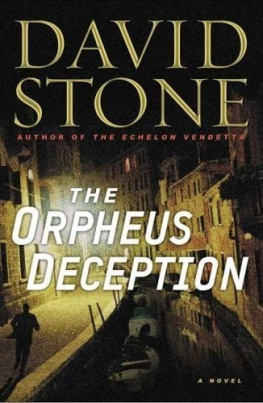

ST. ORPHEUS BREVIARY I.
MARGINALIA
ON
CASANOVA
MIKLS SZENTKUTHY
Selected Other works by
Mikls Szentkuthy
Prae
Az egyetlen metafora fel [Towards the One and Only Metaphor]
Fejezet a szerelemr l [A Chapter About Love]
Szent Orpheus breviriuma [St. Orpheus Breviary]
Divertimento. Vltozatok Wolfgang Amadeus Mozart letre [Variations on the Life of W. A. Mozart]
Doktor Haydn
Saturnus fia [Son of Saturn: A novel about Albrecht Drer]
Mzsk teftamentuma [Testament of the Muses]
Frivolitsok s hitvallsok [Frivolous Confessions]
ST. ORPHEUS BREVIARY I.
MARGINALIA
ON
CASANOVA
MIKLS SZENTKUTHY
TRANSLATED BY
TIM WILKINSON
Contra Mundum Press New York
Szent Orpheus breviriuma, Budapest 1973 by Mariella Legnani and Maria Tompa
Translation of St. Orpheus Breviary, Vol. 1: Marginalia on Casanova 2012 Tim Wilkinson
Translation of Zno Bianus Boudoir and Theology
2012 Rainer J. Hanshe Republished with permission of the author
First Contra Mundum Press edition 2012.
This edition of Szent Orpheus breviriuma: Szljegyzetek Casanovhoz is published by arrangement with Mariella Legnani & Maria Tompa
Originally published in Hungary in 1939 by Kecskemti Hrlapkiad
All Rights Reserved under International and Pan-American Copyright Conventions. No part of this book may be reproduced in any form or by any electronic or mechanical means, including information storage and retrieval systems, without permission in writing from the publisher, except by a reviewer who may quote brief passages in a review.
Library of Congress Cataloging-in-Publication Data Szentkuthy, Mikls, 1908-1988 [Szent Orpheus breviriuma: Szljegyzetek Casanovhoz. English.] St. Orpheus Breviary, Vol. I: Marginalia on Casanova / Mikls Szentkuthy;
translated from the original Hungarian by Tim Wilkinson.
st Contra Mundum Press ed.
360 pp., 5x8 in.
ISBN9780983697244
Contra Mundum Press would like to extend its gratitude to the Hungarian Books & Translations Office at the Pet fi Literary Museum for rewarding us with a subvention to aid the production of this publication.
Table Of Contents
INDICATIVE TABLE OF CONTENTS
[ page numbers refer to the printed edition]
Boudoir and Theology: Introduction by Zno Bianu 0
Vita (Life of a Saint) 2
Lectio (Saintly Reading) 26
Casanova is a descendant of actors: the essence of nature & theatre is always comedy 26
proximity of enlightenment philosophy and superstitions attaching to witchcraft in the 18 th century 27
a white morning; etiquette and bacchanalia; compromise in ideals between anarchic sentiment and genteel civilization 27
The first letters 30
a young girl is possessed by the devil: raw Middle Ages amid Sans-Souci curlicues 30
the ball, the dance, Shrove-tide, Carnival, the mask: harmony of Dionysus and periwig 31
madness in sp ite of which no dissonance 32
the main characters are very old and very young 32
Venice, of course, is an even more important character than the main characters 35
situation is everything, the person nothing 35
baroque pomp and desert leanness: an important duality 37
the mask 39
Italian children preach : th -century piety 40
Venices Santa Maria dei Miracoli 42
Giulietta is twelve years old 43
Venices water ( Gerusch von Ruderschlgen )
master and servant in Venetian love 45
youthful asceticism, pirouette and iron will, chic and adolescent heroism 47
demonic, scholarly, and social respect for Nature; smart philosopher 48
near to Mozarts Queen of the Night: Alles ist Natur
Casanovas biggest piece of advice is not love but thought: Denken Sie, one reads (the very first language in which he was published was German) 53
autumn pavilion, the villa at Pasiano 53
for a big poet even prosaic things are mythical beauties sober technical scheme and moonlit swan rhyme with ease 54
slice of ham still life 55
Italian fall: decay? or precisely formative form? 56
del Piombo: The Death of Adonis (the balancing of Toscanini and Turner) 56
romanticism of death in the rococo 58
reticent Casanova 59
games of hiding; the glowering objectivity of a key a candlestick, the objectivity of a red-hot sword in this world 60
worldly and otherworldly are not noisy opposites in this century 61
dissertating Casanova: doctrorate in law at Padua 62
Cyprus wine but in regard to banquets it is not Rubens, but the strictness of Ferrara that comes to mind, Arabia and not Holland 63
far beyond the bad extremes of adventure and grand passion 66
what Brunelleschi is to architecture, Casanova is to love 67 Casanova, man of bone, not flesh 67
a rooms shape, the height of a wall: those are the most fateful things 71
th -century Italian hostelries
impression of a key in wax 72
wide-branched candelabra, chandeliers 72
cross-dressing, the excitement of swapping roles is there any love without such playacting, a masked game of changing gender? 73
butterfly dance between animal rawness and ascetic propriety 75
Casanovas seesawing between true intellectual and slightly clumsy enlightenment Intellectualism 75
he wanders disconsolately in a dark wood Watteauesque world: chirping mandolin and death 76
then back to sniggering, mundane society: as in the music of that century, after the trios the recurrent minuet 77
the cold mathesis of social life 78
social life does not bother with reality or its interpretation: an end in itself 78
mundane man: nothing more philosophical than that 78
old boneshakers around Naples 80
variegation to the point of kitschiness : but still not that 80
scarlet cloak, black wig, Arabic skin 80
ballet and symphony by Venetian waterside 81
illicit associations of ideas: does the world deserve any better? 81
only a thought is truly demonic 82
ninety-year-old merry women 82
overcome by sea-sickness: in a gondola! 83
interplay of Keatsian climes and bloodthirsty rationalism in Casanova 84
a lonely lantern next to the candelabras 85
four versions of love 85
Palazzo Grimani di San Luca 87
a Greek woman brings Balkan atmosphere 87
midnight vengeance in Venice: this horror story logically belongs to a portrait of Voltaire 89
after the murder he notes: So fein war damals mein Zartgefhl that is the 18 th century 91
that is why this dry positivist recognizes the natural power of the imagination 92
visit at daybreak; breakfast; attends church 93
the compulsoriness of infidelity: with cold heart he turns his back in Venice 94
if it were not for forty days of quarantine at Ancona, everything would happen in another way 95
the greatest intellectual incandescence, the greatest pessimism: that is what is behind so-called joie de vivre
Casanova is culture-in-himself: thus cultures are of no interest to him 95
a Balkan slave-girl 96
strict Florence, puddly Balkans, operatic Orient 97
a balcony 98
in the shadow of the Antichrist and blasphemy 99
peasant old crones 100
Rome in September: he himself is Rome, thus the city has no influence on him 101
spring is also fine, the money is also good 102
a little Byzantine history in the name of southern wines 103
mercury alongside muscatel wines: even that is too instructive 105
Next page
